What Is Parvo In Dogs?
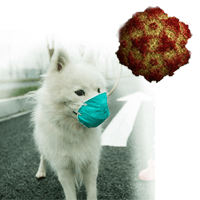
Parvo Virus In Dogs
Canine parvovirus (CPV), as the name suggests, is a viral infection that is highly contagious in dogs. It’s part of the Parvoviridae virus family. The CPV initially infects the lymphoid tissue in the throat of a dog after it has been swallowed. It replicates here before moving through the bloodstream to attack the fast dividing intestinal cells, bone marrow and lymph nodes. Here it specifically attacks the lymphocytes so as to suppress the immune response and the intestinal tissue. Leakage of the intestines due to damaged tissue causes sepsis and death as the toxins that are usually contained within our digestive tract leak out into the blood. Suppressed immune system can lead to secondary infections as the dog is too weak to keep them at bay.
Parvo Symptoms In Dogs
Parvo occurs as two types of infections: intestinal and cardiac. The most common form is the intestinal form and this will be seen as regular gastrointestinal symptoms such as vomiting diarrhea, lack of appetite and weight loss. You may see blood in the stool of your dog and notice a lack of energy and fever as well. However, you may find that your dog is cold, rather than hot, as parvovirus infection can also cause hypothermia rather than fever in some cases. The abdomen may become distended and sensitive to touch, causing your dog pain if you press on it or try to lift him. These symptoms will usually show 2-10 days after infection and if they are not treated, there is a 90% fatality rate from this infection.
Signs Of Parvo In Dogs
Parvo Symptoms In Dogs And Puppies
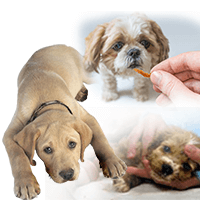
Parvo symptoms in dogs are gastrointestinal infection symptoms. The abdomen may swell up as it retains fluid and your dog will experience vomiting and diarrhea. Because of this, it will not really want to eat so you’ll notice a lack of appetite and then a lack of energy as it isn’t getting any nutrients.
Parvo Virus In Adult Dogs
Most adult dogs should be vaccinated against parvo so should not get infected. However, the vaccine is not 100% effective and adult dogs that are immunocompromised due to illness or disease or who were incompletely vaccinated will be susceptible to infection from the parvovirus. Some adult dogs may contract the disease and not show symptoms, but they will still shed the virus into the environment. This is why it’s important to vaccinate your dog, as you can’t always tell which others around it are carrying the infection.
Parvo In Old Dogs
What Causes Of Parvo In Dogs?
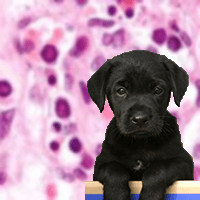
Parvo is caused by the canine parvovirus (CPV). Most cases are caused by an altered version of the original CPV, call the CPV type 2. This has small genetic differences to the original CPV. the CPV is transmitted through the fecal oral route, meaning that it’s excreted in the faeces and then picked up by another host. This can be through direct contact with fecal matter or with an infected dog or it can be carried by not washing your hands after coming into contact, probably unknowingly, with the virus when picking up your dog’s poop. The live virus will also be present in any vomit your dog brings up, so make sure to clean it up thoroughly.
Improper vaccination is a major component of infection, especially due to how easily the virus can spread. Breeding kennels and dog shelters are havens for it to hop between unvaccinated, susceptible hosts. It seems that certain species are also more susceptible to infection than others, such as Rottweilers, Dobermans, Pit Bulls, Labradors, German Shepherds, English Springer Spaniels and Alaskan sled dogs. Due to its high resistance to environmental changes, vaccination is the best and only way to prevent parvo infection as it could be anywhere.
How Is Parvo Virus Diagnosed?
The blood tests will show low white blood counts as the virus attacks these, causing immune system suppression. The virus will show up in high numbers in the stool and this can be detected with an ELISA assay right there at you vet’s surgery. It gives a positive or negative result for the presence of proteins that you immune system makes in response to the virus’s presence and will give a good indication as to whether you dog has parvo or not, but it is not 100% accurate so further tests will still be done. However, it does allow the vet enough information to start treatment for parvo while those test results are being waited on.
Parvo Vaccine
The vaccine for CPV is usually given as part of the standard puppy vaccines once your puppy is 6-8 weeks old. It’s one component of a mixed vaccine that usually also includes distemper, leptospirosis and hepatitis. It will then need to be followed by boosters to make sure that full immunity is achieved. These first vaccines are often done by the breeder, as puppies should not be taken away from their mothers until they’re 10-12 weeks old. When taking your puppy home, you should ask for the vaccine information and when the next booster is due.
How To Treat Parvo In Dogs
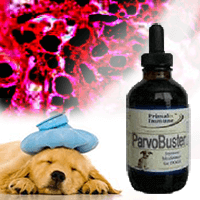
Because parvo is caused by a virus, there are no direct treatments to cure it. Viruses replicate within the cells of the host, using the host’s mechanisms so drugs can’t detect and kill the virus without also damaging the host cells as the components are the same. Treatment for parvo, therefore, is designed to support the immune response and reduce the symptoms. It’s important that you get your dog to the vet as soon as possible when you see the signs of parvo as the symptoms are extremely harmful. The chances of survival are greater if they are treated quickly.
Some vets may opt to doing a blood plasma transfusion. This is where the plasma from a dog you has survived a parvo infection is given to an infected dog. The plasma contains antibodies to the virus and is used to boost the immune response of the infected dogs to fight against it. Worming treatment is also given just in case there are any gut parasites as they would slow down recovery of the intestines.
Parvo In Dogs Treatment Cost
Because of the required stay in the clinic and isolation of the dog as well as all the quarantine measures and medications, a parvo infection can cost hundreds of even thousands of dollars. Each vet will have his own system for treating parvo in dogs and his own course of medication so the cost will vary between clinics. It will also depend on how severe the infection is before you take your dog in as more severe infections require more treatment. Once insurance company quoted the average cost for parvo treatment as $717.59. No matter what, it will be expensive. The vaccination, on the other hand, costs around $30-$80.
Home Remedies For Parvo In Dogs
Due to the vomiting and diarrhea, a dog with parvo will quickly become dehydrated. If this continues, severe dehydration can be fatal. Make sure that you keep your dog well hydrated, giving it plenty of water. However, the best thing to do is to get your dog to the vet as soon as possible, especially if it is not taking in fluids. The chances of survival are much lower with home treatment, though the cost is also significantly less.
Parvo In Dogs Treatment For Home
Treating parvo infections at home is not recommended. You risk the life of your dog more by not taking it to the vet. However, if you do insist on home treatment, at least go and see you vet and get the appropriate medications, such as antibiotics, anti-diarrheal and anti-vomiting drugs, possibly even something to bring down the fever. You must also keep your dog quarantined in a clean environment and make sure it’s well hydrated at all times.
Is Parvo In Dogs Curable?
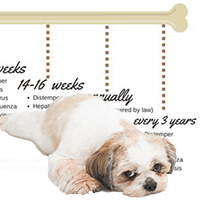
The good news is that if you catch parvo early enough and get your dog to the vet quickly, there’s a 70-80% chance that the infection can be cured. Though this is not the case for puppies, who rarely survive the disease.
Once the worst of the infection is over and you can bring your dog home, it still needs some care and attention. Your dog will be weak from the lack of nutrients during the attack on its intestines and while its gut tissue heals. You’ll most likely be prescribed a very bland, easily digestible food from your vet for the next few weeks. You also have to make sure that any course of antibiotics that was started during the hospital stay are finished completely. Depending on how severe the infection was, your vet may also give you some anti-diarrhea and/or anti-vomiting medication. Your dog will have some loose stool for a little while post infection while the digestive tract repairs itself.
Can Parvo Be Cured In Dogs?
Prevention Of Parvo In Dogs
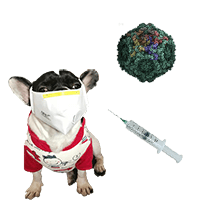
The best way to prevent parvo is to vaccinate your dog. As a puppy, it will receive immunity from its mother, as long as she was vaccinated fully. As this wears off, a vaccine and two boosters are needed to provide the pup with its own immunity. Before your puppy receives its vaccinations, don’t take it to public places where other dogs have been. Wait until it has received the full course of vaccinations and then keep in mind that it takes usually around 5 days after the injection for the immune response to be complete.
Decontaminating the environment is a huge factor in preventing the spread of the virus. An dog that has survived a parvo infection will still be shedding the virus in its stool for up to three weeks after it has been cured, so keep this in mind for the safety of other dogs in your home and in the area. Thoroughly clean up any fecal matter and give the space it sat on a spray with some bleach just to make sure that there are no virus particles being spread around. The parvo virus can survive up to a year in the soil, so care must be taken to avoid this.
Parvo In Humans
Question from a reader about Parvo
My dog Fab (who we suspect is suffering from Parvo) is very skinny and still poops blood. He seems in fairly good spirits though, comes out every time I walk the dogs.
Read that egg yolks are supposed to be good for Parvo, but he wouldn’t eat it!
We give him Yogurt for the stomach pain, I read that is good too. We give him liver and boiled chicken blood, since he looses lots of blood. There is a Chinese saying, eat what ails you or something like that……Thought that might help.
Not sure what to give him, do yo have any ideas?
Answer from vet
Here are some rules in Parvo:
-It is a serious illness and fatal in some cases. What causes death is the dehydration, you must give him enough water and ideally get him rehydrated with serum if you have a vet nearby.
–Hand feed him and make him drink enough water/milk with a syringe
-If the dog is not sick for 5 days, you can say he has recovered.
-You must give him drugs that line the gut wall because it is bruised (Gaviscon, Smecta, …). egg yolk is good too, So is Yogurt.
– The blood takes time to get formed in the body, so the boiled blood will take too much time after digestion to synthesize blood cells.
What we need here is to stop the bleeding: Use Etamsylate ( Dicynone or equivalents)
– What to give: Drugs: Antivomitive drugs (Primeran or equivalents), Anti hemorrhagic drug as I said, gastric protectors like egg yolk
Foods: for now don’t give him a lot of meat since his gut does not digest and absorb well. Consider the water of boiled rice added with some sugar and salts. with a syringe make him drink a lot, Milk products, eggs, prioritize liquid food…
If he gets to eat and his poop becomes more brown, then switch to solid foods
![Canine Distemper-The Dog Killer! [Please Read THIS before putting your Dog to sleep] Canine Distemper-The Dog Killer! [Please Read THIS before putting your Dog to sleep]](https://shihtzuexpert.com/wp-content/uploads/2017/07/Canine-Distemper-The-Dog-Killer-FEATURED-IMAGES-750x-358-1.png)
![10 Best Dog Crates for Separation Anxiety [High anxiety dog crates 2019 Reviews] 10 Best Dog Crates for Separation Anxiety [High anxiety dog crates 2019 Reviews]](https://shihtzuexpert.com/wp-content/uploads/2019/05/5-3.jpg)

![12 Best Dog Foods for Toy Breeds [Buyer's Guide] 12 Best Dog Foods for Toy Breeds [Buyer's Guide]](https://shihtzuexpert.com/wp-content/uploads/2019/05/3-5.jpg)
